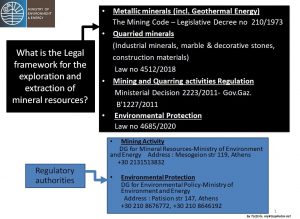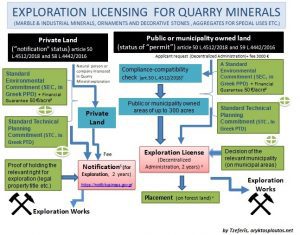

The Greek Mining/Metallurgical Industry (GMMI). Greece continues to maintain leading positions worldwide in the production and export of many key note (metallic and quarry) minerals and thus maintaining a strong comparative advantage over other EU countries. Greek mining and metallurgical industry (without taking into account the hydrocarbon sector) constitutes an important sector of the economic activity of the country as it supplies essential raw materials for primary industries and various downstream users. It covers metals (bauxite, nickel, lead, zinc, gold, copper, etc.), industrial minerals (bentonite, perlite, magnesite, pumice, gypsum, calcium carbonates, huntite and industrial clays), marbles, ornamental stones and aggregates. The Greek mining industry at-a-glance:
- Accounts for almost 3% of the Greek GDP
- Generates a total value of more than €2 billion annually, roughly 50% of which is exported
- Constitutes almost 5% of total Greek exports
- Employs directly roughly 20,000 individuals and indirectly 80,000 individuals

 Legislation. The Greek Legislation (the Mining Code, namely L.210/1973) distinguishes mineral raw materials into two main categories:
Legislation. The Greek Legislation (the Mining Code, namely L.210/1973) distinguishes mineral raw materials into two main categories:
a) “Metallic Minerals”, the right of which, either on the surface or underground, belong either to the state, and is leased or, in most cases, it is conceded, with a “Presidential Decree”, under which the right of mine ownership is established (the so called concessions or private mines). The mining concession establishes an independent mineral ownership right on the mine and the metallic minerals extracted from it, which is separate and unaffected by any title and ownership rights on the mining area. However, in order for the concessionaire to be able to actually mine the mining area, including the deployment of related facilities, he must first reach an agreement with the land owners concerned regarding the use of the surface of that area. and
b) ”Quarry Minerals”, which belong to the landowner of the area they occur in, the owner being exclusively entitled to exploit them, either himself or through an agreement with a third party.
The Ministry (YPEN) is the competent authority for the environmental and technical permitting of surface and underground mines. Also it is the competent authority for approval of any technical exploitation study for both quarry and metallic minerals, in accordance with the Regulation on Mining and Quarrying Works (KMLE) and for environmental terms approval (ETA) of extractive works included in sub-category A1. For ETA’s of works in the sub-category A2 the competent authority is the relevant Decentralized (Regional) Administration. For B category there is no need for an ETA (Approval), but only for a Standard Environmental Commitment (SEC).
After L. 4512/2018, the Decentralized (Regional) Administration is the authority responsible for issuing exploration and exploitation permits for industrial minerals, marbles and aggregates on public (state-owned) areas. Actually, as the L. 4512 /2018 provides, there is no permit, the lease contract of the requested area is considered and serve as “permit”. On private lands a “notification of start of activities” procedure to all relevant authorities, is established by the same law, allowing for effective supervision afterwards.
The notification shall be made exclusively through an Integrated Information System specially designed for this, https://notifybusiness.gov.gr/. In all cases, permission of works is given upon verification that no problems or disturbances are created to neighbors, archaeological sites, buildings and built-up areas, public works or the environment (Ministry of Culture Approval, Mining Inspectorate Consent etc.).
The exploitation permit for all kind of quarry minerals is valid for a time period of 20 years and can be extended for an additional period of 20 years respectively, and then by 10 years each time so as to reach 70 years in total, L.4512/2018.
Administrative tools-Access to Information
- Quarrying and Mining activity, annual minerals report (www.latomet.gr)
- Digital environmental registry of quarrying and mining projects (http://eprm.ypeka.gr)
- The online platform for “business notification” (https://notifybusiness.gov.gr). This platform covers all cases where “license” or “permission” has been replaced by “business notification”
- Country profile in RMIS (https://rmis.jrc.ec.europa.eu)
- Transparency portal (https://diavgeia.gov.gr/)
- Environmental Impact Assessment licenses (http://aepo.ypeka.gr/)
You can get a better information on licensing system for Mining and Quarrying works, by studing the attached review article by Dr. Peter Tzeferis, General Director for Mineral Raw Materials Gen. Directorate, Greek Ministry of Environment and Energy. See full article here: The licensing system for Mining and Quarrying works in Greece, 2018
